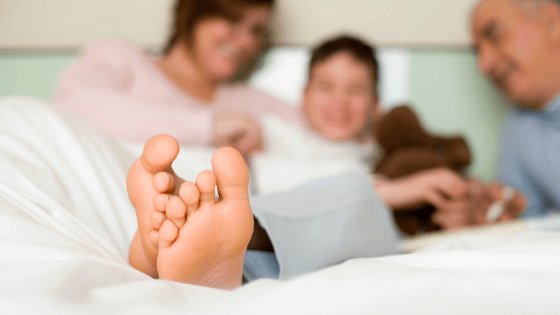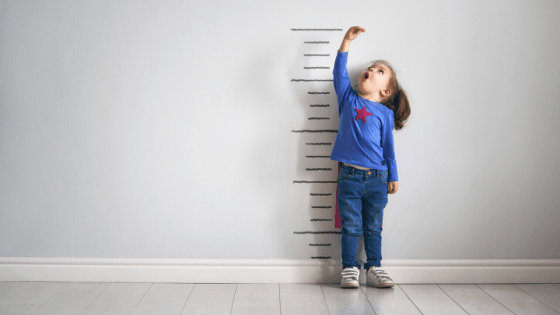Growing pains are achy, cramping muscle pains that are often experienced in the calves, front of the thighs or behind the knees. These pains tend to happen during the night and affect both legs. Some children even wake up. Despite these pains being referred to as growing pains, no evidence exists that growing hurts.
Growing pains might be attributed to a lower pain threshold or, in some instances, to psychological problems.
Does your child wake up at night as a result of aching legs? It’s possible that he or she may experience growing pains.
Growing pains are typically felt by pre-schoolers and preteens alike. It usually starts with early childhood, around the ages of three or four and often strike again at the ages of eight to twelve. The pain generally starts in the late afternoon or during evenings.
*** Disclosure – this post is sponsored by Penpharm Growing Pains ***

What Are The Causes Of Growing Pains?
Despite the name being “growing pains”, no evidence exists of these pains being linked to growth spurts.
It is possible that growing pains might merely be muscle aches as a result of intense childhood activities that are wearing the child’s muscles down. Such activities may include jumping, climbing or running. Growing pains are more commonly experienced by kids that had a particularly busy day of sports.
Symptoms Associated With Growing Pains
Not everyone experiences growing pains in the same way. Some children may have a lot of pain, while others don’t. Most children do not experience pain on a daily basis. These pains can come intermittent for months and even years.
The majority of children outgrow growing pains within the space of a few years. The pain is generally felt during late afternoons or in the evening, just before dinner time or during bedtime. The legs pains might be so painful that the child is woken up from sleep.
If your child appears to be perfectly fine during the morning, do not assume that he or she was faking. Growing pains usually disappear when morning comes. They typically don’t influence a child’s ability of playing sports or being active and they can go about their day as usual.
Generally, growing pains are present in both legs, particularly in the back of the legs (calves, behind the knees or in the front sections of the thighs. Studies propose that kids who are having growing pains might be more susceptible to pain. These children may have a tendency of experiencing abdominal pain and headaches.
How Are Growing Pains Established?
A medical physician can usually diagnose growing pains after examining the child and asking questions about his or her symptoms and medical history. It is essential to rule out all other probable causes of the pain prior to making a diagnosis of growing pains. This is why it is crucial to see your doctor if you suspect your child is experiencing growing pains or limb pain. If the child has growing pains, the physician will not notice any abnormalities during the physical examination. X-Rays and blood work are typically not required in this instance.

Are Growing Pains Treatable?
Treatment for growing pains is contingent on the level of pain the child experiences. These remedies might ease the discomfort and assist with helping your child feel better:
Helpful Remedies For Growing Pains
- Massaging the affected area.
- Placing a heated pad on the affected area.
- Giving the child acetaminophen or ibuprofen. Avoid giving a child or teen aspirin, as it has been associated to a rare but severe and life-threatening illness referred to as Reye syndrome.
If the pain persists and is not getting better, you can ask the health care provider if you can give your child over-the counter pain medicine like ibuprofen or acetaminophen. Also ask about the appropriate dosages for a child.

Penpharm Growing Pains – An Excellent Remedy For Growing Pains In Children
Penpharm Growing Pains comes as a welcome and much needed remedy for parents who have children that are experiencing growing pains.
The formula works in two ways:
- Providing relief for the pain associated with growing pains.
- Providing nourishment with nutrients that is crucial for healthy growth and recovery.
The three primary agents in Growing Pains:
Magnesium
Following a magnesium-rich diet is vital for children to make them less susceptible to growing pains. Magnesium is among the core minerals that is contributing to the structure of bones and it enhances bone mass in children from an early age. Magnesium is also essential for maintaining joint cartilage. This mineral plays a paramount role in the overall health of a person’s nutrient-converting cells. The more active a child is, the more magnesium will be utilized by the body. Not only does magnesium have a calming influence on moods, but it can help with combating irritability and anxiety. This can help with taking off the edge associated with growing pains.
Vitamin K2
Vitamin K2 is viewed as a miracle nutrient, since it is critical for the body’s ability to repair joints and bones that are under stress. Vitamin K2 works in conjunction with magnesium to promote healthy bones and to assist with easy absorption and achieving bone mass.
MSM (Methylsulfonylmethane)
MSM is a natural substance found in vegetables, nuts, fruits, seeds, and dairy product with a full-fat content. MSM is an essential nutrient for growing children. Because it contains 34% sulphur, it is considered as the fourth most abundant mineral in the human body. Sulphur deficiency in children can result in:
- Slow growth
- Fatigue
- Poor immune response
- Weak joints
Studies revealed that several conditions like joint and muscle pain, inflammation, antioxidant capacity and oxidative stress can be improved by taking MSM supplements.

When Must A Doctor Be consulted?
When you notice any of the following symptoms accompany the pain symptoms in your child, call your doctor immediately.
Pain in the mornings, long-lasting pain, redness or swelling in a specific area or joint.
- Pain linked to an injury
- Fever
- Limping
- Loss of appetite
- Unusual rashes
- Weakness
- Strange behaviour
- Tiredness
These signs are not common with growing pain and must be checked by a doctor. While growing pains do not typically bear relation to illness, they can be upsetting for both parents and kids. Offer reassurance and support when your child is suffering from growing pains. The symptoms will pass as your kids grow up.
 Kaboutjie SA Mommy Blogs by Lynne Huysamen
Kaboutjie SA Mommy Blogs by Lynne Huysamen





This is very interesting! I always thought growing pains were just a myth because I had never experienced them. I thought maybe it was just something other parents told their kids to qualify their aches. But this was a very informative post and gave me a good insight into growing pains.
I remember our 15-year-old struggling with growing pains when she was around 8-years-old, we used to rub her legs at night before she went to sleep. So far my son hasn’t experienced any growing pains but then he didn’t seem to struggle with teething either, so I definitely agree some children seem to be more susceptible or sensitive than others. Was very happy to see there’s a natural remedy on the market (and those ingredients sound like the perfect mix), certainly not keen on the idea of children taking pain killers if they can avoid them.
Oh, have seen so many kids complain of aches and pains but wasnt aware that they’d be suffering from Growing Pains. Glad there are remedies for it and parents can seek a doctor for the same. Thanks for this enlightening and informative post, Lynne!
I had no idea that growing pains was a real thing. However my son complaint of such pains when he was in pre-school. I massaged his legs with warm oil which definitely helped him at the time. I will be careful when he reaches the next stage of growing pains i.e. in his teens. Thanks for sharing this post.
I know a lot of my friends massage their kid’s legs at night because of the pain. I myself sometimes do it to my baby and he loves it. Thank you for the information on all the nutrients essential for growing. I didn’t know about K2 before. Will find out which food is rich in this source.